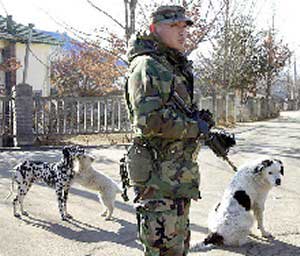| DPRK stands for the Democratic People's
Republic of Korea.
Spokesman Ari Fleischer said Wednesday
the White House had heard no official word from Pyongyang.
"That's an additional unfortunate comment
that North Korea has made," he said of the North's reported dismissal of
a possible aid deal.
The United States has been seeking a diplomatic
solution to the nuclear crisis, and in a further step toward a peaceful
settlement, North and South Korea on Wednesday set dates for Cabinet-level
talks Jan 21-24.
U.S. envoy James Kelly, before meetings
in Beijing on the North Korean stalemate, said he was "reassured" by efforts
to persuade the North to give up its nuclear weapons development.
Kelly earlier this week had extended one
of Washington's tentative aid offers. And China has offered to host negotiations
between the United States and North Korea.
Still, there were signs the North has increased
military patrols near its border with the South, and the reclusive regime
in Pyongyang kept up its stream of anti-American invective through its
state-run media.
In addition to rejecting the possibility
of aid, the North also blamed nuclear proliferation on the United States
and accusing Washington of using its weapons to threaten and blackmail
other nations.
Tensions on the Korean peninsula have been
rising since North Korea admitted in October to having a secret nuclear
program. Last week the communist regime withdrew from a global treaty aimed
at limiting the spread of nuclear weapons, and threatened to resume missile
tests.
The U.S. military spotted increased patrols
by North Korean soldiers over the past week in part of the Demilitarized
Zone dividing the peninsula, said Lt. Col. Matthew Margotta, who commands
a combined battalion of U.S. and South Korean soldiers.
But the activity in the 2 1/2-mile-wide,
156-mile-long DMZ were "not alarming, just unusual," and were probably
"triggered by a heightening of tensions," Margotta said.
The North Koreans have also occupied a
guard tower in the DMZ that hadn't been used in years, he said.
In a speech Wednesday at the Yongsan command
headquarters for U.S. troops in South Korea, President-elect Roh Moo-hyun
called the U.S.-South Korean alliance the "driving force" for security
in the region.
"We can never accept North Korea's nuclear
weapons program," Roh said, calling for international diplomacy to defuse
the standoff. "The South Korean-U.S. alliance should be the basis for this
effort."
The United States keeps 37,000 troops in
South Korea, and the accidental killing of two teenage girls by American
soldiers driving a military vehicle had increased calls that the force
be scaled down.
The North has continually tried to drive
a wedge between the South and the United States, its key ally, and on Wednesday
called for a joint Korean struggle against "U.S. imperialists."
"If the North and South join forces and
take a joint stand, we can protect the nation's dignity and safety against
U.S. arrogance," said Pyongyang Radio, monitored by South Korea's national
Yonhap news agency.
Also Wednesday, the head of the International
Atomic Energy Agency, Mohamed ElBaradei, urged Russia to get involved in
diplomatic efforts, saying Moscow could play a "vitally important role."
Throughout the conflict, the North has
maintained its insistence that the United States sign a nonaggression treaty
in exchange for dialogue - a condition it repeated Wednesday.
"It is clear that the U.S. talk about dialogue
is nothing but a deceptive drama to mislead the world public opinion,"
the news agency report said, quoting an unidentified foreign ministry spokesman.
He also reportedly said the stalemate could
be resolved only when both sides negotiate "on an equal footing through
fair negotiations that may clear both sides of their concerns."
Also Wednesday, the news agency rejected
international concern over its nuclear programs and blamed nuclear proliferation
on the United States.
"In 1945, the U.S. produced three A-bombs
and tested one of them in its mainland and dropped the other two on Hiroshima
and Nagasaki, inflicting nuclear holocaust on the Japanese for the first
time in human history," the dispatch said.
The report, monitored in Seoul, said the
United States and other countries were trying to shift the blame to North
Korea, pressuring it to rejoin the Nuclear Nonproliferation Treaty, which
says only Britain, China, France, Russia and the United States can have
nuclear weapons.
Associated Press
|
